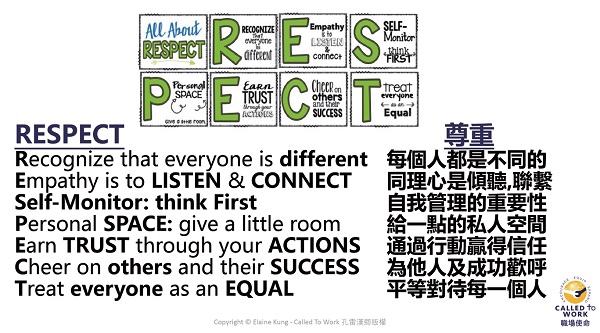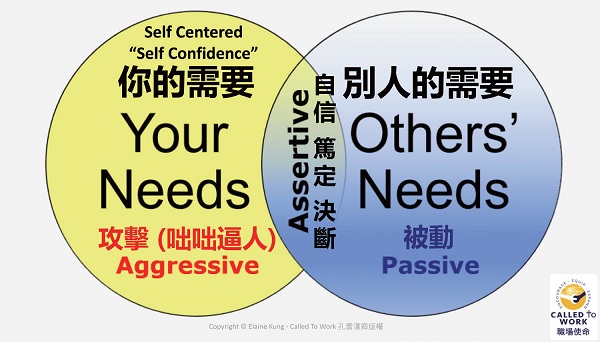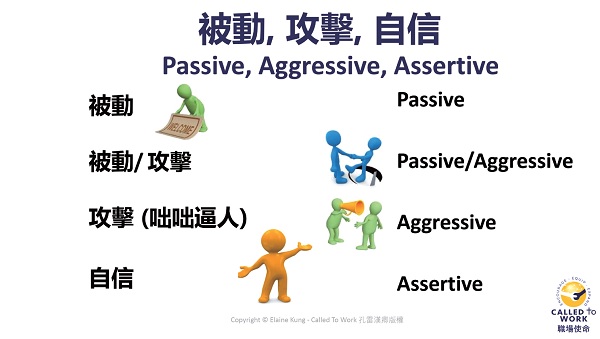Respect every life and live your best self
[Heavenly Worker] Column
Oral narration and photos provided╱Kong Leihanqing‧Interview╱Yang Xuejing

Some people may view the workplace as a game of hearts and a duel on the battlefield. In competitive relationships of varying degrees, conflicts can be seen everywhere, even mixed with prejudice and discrimination.
For people in the workplace in heaven, work is God’s calling; everyone in the workplace is a unique creation of God, with dignity and glory bestowed by Him. How to establish a healthy relationship in competition according to God's will, so that every life can get the respect it deserves, and let yourself live out the mission given by God in the truth?
This article will focus on: the relationship between justice and self and others; how to recognize a positive image of oneself, so as to build character, humility, and act bravely. When people in the Kingdom’s workplace live out the Kingdom’s values, the battlefield can also become a harvest field.

Humble and confident
Due to globalization, human resources come from different cultures, regions, backgrounds, and ethnicities. This is exactly what the Apostle Paul said:"Just as the body is one but has many members.". Since each limb is connected to the same body and respects differences instead of discriminating against them, only then can they cooperate with each other and allow the body to function normally. Only by showing individual distinctive characteristics can it be like a bowl of wonderful and diverse mixed salads that come together to create multi-layered richness.
I have been in the United States for 42 years, and I have also encountered or felt injustice. But in the current environment, people are more sensitive to and more respectful of cultural differences. This is a healthy trend. Many large companies place special emphasis on ethnic minorities and pursue cultural diversity. The company I worked for provided many opportunities for women or ethnic minorities. It can be said that I am a beneficiary of this policy. Therefore, it is difficult to distinguish whether it is based on ethnic background or whether personal abilities are valued? Maybe both. But the most important thing is that my abilities, background, and ethnicity are all blessed by God and used by God.
For Christians, no matter what the policies are or whether discrimination exists, they must live their best selves. Although the environment brings different challenges and pressures, you still need to know who you are and see yourself in the right light; do not let other people's words and deeds devalue your own value and control your responses. Only by establishing a relationship with God and being rooted in truth and eternity can we establish a relationship with ourselves with a healthy attitude. Only by looking at ourselves correctly can we deal with people and things better and gain firm confidence in God.
No matter where you live or work, having firm self-confidence is crucial when dealing with cultural differences. Don't belittle yourself too much and always see shortcomings; or be limited by your ethnic minority background and attribute any failure to discrimination or prejudice.
First of all, we must know: our identity is God’s precious children; in the Lord we are"A chosen race, a royal priesthood." (Refer to 1 Peter 2:9)In the workplace, we are Christians first, and then we have other identities and titles. Understand this, and in the face of unpleasant encounters and cultural shock, you can still have firm confidence in God, build trusting relationships with others, and respect each other.
The Chinese are deeply influenced by Confucianism and value humility in dealing with others. As a result, they do not know how to accept compliments and even pretend to be self-deprecating. This kind of false humility gives other ethnic groups the impression that Chinese people lack self-confidence. We must realize that humility does not mean devaluing one's self-worth, but seeing oneself as "in line with the right path"; being less self-righteous does not mean looking down on oneself. When you receive appreciation, you should accept it calmly, affirm yourself and the other person or team. Being pretentious will result in losing the opportunity for positive communication and communication with others.
I used to work in a high-tech company, and most of my colleagues were white men. When I was starting out, they were all older than me, so I also experienced some shocks in terms of gender, age, and culture. However, I found a turning point in facing difficulties, which is to see myself correctly as God sees me, build up my character, do justice and love mercy; practice the humility taught in the Bible: not to be self-centered, not to underestimate myself, and to be willing to listen. and communication. And walk with God by praying at all times. God gave me confidence and gave me the courage and wisdom to say the right words and do the right things at the right time, thereby breaking through cultural limitations and blazing my own path.
Conflict can also bring blessings
Wherever there are people, there is conflict; where there are jobs, there is competition. When workplace resources are limited and everyone wants to get them, conflicts are inevitable. The first thing at this time is not to find solutions, but to change your thinking and attitude.
Competition can be positive, and only with competition can progress be achieved; conflict can be benign, and can bring three blessings:
1. Establish relationship:If conflicts are handled properly and mutual understanding is improved, better relationships can be built.
2. Result:If you can put yourself in others' shoes during a conflict and use good questions to increase communication, you are not limited to yourself or the other party. You can understand different solutions and generate team consensus, so that 1+1>3 can get the best results.
3. Manifestation of the true life of Christians Real Christian Faith:The difference between Christians and the rest of the world can be highlighted by the way Christians deal with problems and pressure at critical moments of conflict.
In a workplace with diverse cultural values and beliefs, before resolving a conflict, you should first understand whether it is caused by race, personality, or behavioral style? Find out the crux, prescribe the right medicine, set common goals, and focus on the overall situation. Start with consensus first, and then deal with differences; seek common ground while reserving minor differences, and pursue team unity. We must consider that everything has both positive and negative sides; be tolerant and patient, accept the Bible’s teachings and the boundaries of truth positively, respect various cultures, backgrounds, and styles, and combine everyone’s strengths to create a win-win situation.
Different ways of responding to conflict will lead to different results:
1. Avoidance response peace faker:Sometimes evasion is an expedient to avoid authority. If you avoid because you are afraid of losing to the other party and do not really solve the problem, both parties will lose.
2. Response to attack peace breaker:Aggressive, I win, you lose, must win response.
3. Mediation's response to peace maker:Pursue win-win, true peace. Use the most spirit, wisdom, methods and skills to mediate and let our lives become a channel for God’s blessings.
Communication is very important when dealing with conflict, and avoid exaggerated accusations, such as: You always...; You always.... Secondly, we must be restrained in our words: speak less golden words and speak more golden words. When the tension is high and the anger rises, you must be able to adjust the pressure and stop when it is time to stop. When discussing, be upright and discuss matters as they are, without involving personality or race. Separate things clearly, understand the root of the conflict, discuss objectively based on the reasons, start by thinking about a win-win situation, first move toward the goal of common ground, then handle differences according to priorities, and understand the needs of the other party. If you really encounter injustice, prejudice, or personal attacks in the workplace, you should stand up bravely and find a solution. You should no longer just avoid, adapt, compromise, or fight back.

Establish boundaries and stand up for yourself
When encountering injustice and discrimination, the most difficult thing to overcome is often one's own pride. You can't let go of your self-esteem and feel devalued; your work contributions are not recognized, and there are conflicts of interest between people, things, and things, including promotions and salary increases, which makes you feel frustrated.
The Psalm says that our good is not in God. Asking God to help and redress our grievances does not mean condoning injustice. You should also adjust your mentality, establish boundaries and a pious character, and stand up through communication to safeguard the rights of yourself and others.
How to do it? First of all, lead yourself before leading others: be self-aware and have a correct self-understanding. If you encounter unfair treatment, you can clearly understand your principles and have the courage to establish boundaries.
I often see people in the workplace lacking the self-confidence to fight for their rights and interests and easily compromising on the status quo: If the company says they won’t raise their salary, they won’t; if their superiors don’t agree, they won’t. Some Christians or women are like a carpet that has been trampled on, allowing others to treat them as they please, dwarfing themselves and passively escaping. This is not true humility. What's worse is that some people dare not establish boundaries, but they do so in an illegal way and hold others back, violating the teachings of the Bible.
In the face of injustice and prejudice, we must have firm confidence and determination, and not be aggressive and provocative. Instead, we should care for each other with grace; see others and see our own needs; understand the culture and characteristics of others, and stand up for ourselves, others, faith, and justice on the basis of better communication and truth.
Some people hide their Christian identity because they are introverted and think they lack a good testimony. However, the advantage of people in the workplace in heaven is the faith in themselves and God given by God. By practicing character and humility and praying frequently, you can have the courage to admit your own limitations. Being able to apologize frankly and sincerely when facing mistakes will bring you closer to the other party. This is a privilege and a blessing, and the most wonderful testimony. Practice 6M and 8Q with a humble attitude and win the respect and trust of others. When people see our humble and sincere attitude and are willing to be humble enough to let you see their needs and ask about the reason for hope, they will have the opportunity to preach the gospel and become the spokesperson of the truth.
Clever as a snake, gentle as a dove
At the beginning of my career, people thought that as a Chinese-American woman, young and petite, with imperfect English, I should work hard, not express opinions in meetings, and not receive feedback. However, I wanted to break through racial prejudice and try to express my views. Even though my speech was not as active as others', people viewed me with double standards due to their racial stereotypes and labeled me as aggressive. I also became a victim of discrimination due to injustice and being subject to other people's stereotypes. Later, I learned to pray at any time and ask God to give me wisdom, to deal with the situation calmly and objectively, to clearly understand my identity in the Lord, and to no longer follow others’ approval. God has also led me to stop limiting myself due to prejudice.
Even when someone doesn't want me to speak, I ask good questions at the right time. Try my best to make meaningful and valuable opinions and contributions: Before the meeting, prepare hard, ally with partners early, and reach consensus on my proposal. In this way, my proposal can be accepted by key people at the meeting. During the meeting, first recognize the valuable opinions of others, and based on them, further make suggestions for development. After the meeting, follow up carefully, just like the meeting I chaired. If there is no clear person in charge, I will take the initiative to summarize the meeting and issue an action plan so that the opinions contributed by me and the team can be better integrated into the decision. Then I work hard to execute and deliver results to win people's trust and respect, and build my personal reputation with excellent execution. In an informal and relaxed setting, you can learn Western cultural values while also sharing the uniqueness of Asian culture. For example: bringing Chinese food to the office during Chinese New Year, making dumplings for a work lunch party, explaining the deeper meanings of some Chinese characters, such as: crisis = danger + opportunity.
After 33 years of experience in the workplace, we not only work hard, but also be sons of peace; head up, work smart, look up to God, and stride forward in interpersonal relationships. When you need to step forward, be as smart as a snake and as gentle as a dove: manage your emotions with high emotional intelligence, state the facts calmly, make good use of data to express your appeal and explain your feelings, and avoid emotional arguments.
I face work with this attitude and have been responsible for 16 important positions in 33 years. In addition to working hard and doing many things, I also communicate with others to let everyone know who I am and build my personal professional image and reputation. Most of these positions are because my mentors and senior executives know my personal brand (word-of-mouth) and take the initiative to ask me to take responsibility.
When our abilities, personal contributions and professional reputation are clear and we have the opportunity to communicate with people, those who need you will automatically invite you to join. Asking for the guidance of the Holy Spirit to express yourself appropriately at the appropriate time is to bring Jesus into the work.
Some people once criticized me for being hypocritical. Although I was facing big problems, I took a calm and positive attitude. Do I need to argue about this? of course not!
If you want to change other people's prejudices, the most effective medium is behavior, the so-called "Actions are louder than words." Care without hurting; be curious without criticizing; build relationships before correcting; ask without assuming; take the initiative to understand at the right time and atmosphere. You can say: "I found that we may have a misunderstanding? Can we discuss it?" Make good use of FFRR communication skills: use data to prove facts (Fact), express feelings without criticism (Feeling); explain reasons (Reason); make reasonable requests (Request).
In the face of hostility and conflict, pray for the other person and yourself, and use wisdom to discern what is worth dealing with. In the face of criticism, I am willing to find ways to prove that the other person misunderstood. If the problem is mine, I will sincerely correct it; if it is the other person's fault, I will maintain my way. I live for God, not for others.
Embrace diversity and live out grace, truth and testimony
We know that God is in control, but the world is a lion's den, and there is still the lust of the eyes, the lust of the flesh, and the pride of life... In the universal values of political correctness, adhering to faith may be attacked, but the truth lasts forever. How can a sheep enter the world and then wear wolf's clothing? If you are a sheep, you must live out the character, behavior, and life of a sheep.
For people with different ideas and beliefs, we must imitate the Lord Jesus in being graceful and truthful: we must not criticize with dogma, but we must stay with tax collectors, prostitutes, Pharisees, etc. I don't agree with promoting these crimes. During the same-sex movement parade in the scorching heat, opening the door of the church and giving water to people with different ideas and values to let them rest means loving this person but not loving this sin.
There is a so-called golden rule in sociology: love your neighbor as yourself; treat others how you want others to treat you. However, our thoughts are not the same as others. There is also the Platinum Rule: sacrifice yourself for others; treat others the way they want to be treated. Even better is the Platinum Rule: win-win for each other; understand each other's needs and collaborate, each getting what it needs. The best is Diamond Law: The Sacrifice of the Cross; What Would Jesus Do? Treat others the way Jesus treated me.
Faced with the impact of many cultures and ideological trends, how to exert the influence of faith? Think about it, Jesus entered the world and became flesh; we enter the world and get along with people of different cultures and ideas. We must understand their needs, help them, express the truth with practical actions, love and respect people with the love from God, Impact life with life.
There will always be challenges in big circumstances and small situations, but the Lord Jesus has already won.“The Lord sat as King in the days of the flood;HimSit and reign forever. "With such confidence, we must unite our words and deeds, pray for our enemies, adhere to our faith and the teachings of the Bible, and live out grace, truth, and testimony.

Pursue cultural influence
Warren Buffett once mentioned that his employees must have three characteristics: integrity, intelligence, and vitality, of which integrity ranks first; he will fire employees who are intelligent, energetic, but without integrity.
What is integrity? That is, whether you are alone or in a group; whether in a corner or in the spotlight, you must be unified inside and outside.
Affected by culture, Chinese people are often duplicitous and inconsistent because they dare not express themselves; Westerners are mostly straightforward. We always belittle ourselves; Westerners are extremely confident. We see the boss as superior; Westerners see us as equals. How do Chinese people overcome chronic illness and exert influence in the workplace?
AT&T, where I worked, has always strived for diversity. Among the past 280,000 employees, I was selected to compete with other companies to receive the National Minority Women’s Career Achievement Award. In addition, the company has the first Asian female business executive, Ms. Anne Chow, in its 144-year history. When I retired, the current top CEO, one of dozens of mentors, wrote me a two-page congratulatory message. Many times during his career, he used his personal time to touch my life, write emails, or support me through one-on-one meetings.
I myself have benefited from the opportunities given to minorities and women by companies and American society. God has also helped me build a humility quotient and a character quotient that looks at myself positively, giving me the courage to embrace different cultures.
These experiences suggest that when pursuing cultural influence, you must first overcome the stereotypes of infighting and lack of self-confidence. Disagree or communicate humbly and constructively without limiting yourself. Establish a pious character; speak with courage and curiosity, understand the other person, and think from others' perspective; be honest and honest, stand firm in conflicts, and be one with the inside and outside; have the confidence to live the life of a winner.
We hope that people in the workplace of Heaven will stick to the truth, respect every life, and live out their best selves in the style of Jesus in terms of attitude, ability, words, and actions. Because whether inside or outside the workplace, the branches connected to the vine will flourish and grow vigorously.
Note:
- Six M: Wear Christ and live a godly spiritual character Model Godly character; do the work at hand and leave the results to God Make good work; treat people with grace and love Minister with grace and love; shape office culture Model culture; have the courage to become a spokesperson for truth and justice; Mouthpiece for truth and justice; become a Messenger of the gospel.
- Eight quotients 8Q: CQ character, HQ humility, EQ emotional quotient, LQ leadership quotient, AQ reverse quotient, IQ intelligence quotient, XQ change quotient, SQ spiritual quotient.

Respondents
Kong Leihanqing(Elaine Kung), founder, president and speaker of "Workplace Mission". He has held multiple technical and business leadership positions at Bell Labs and AT&T, providing career guidance and other life skills needed by people of all ages. After retirement, she and her husband devoted themselves to evangelism and discipleship training. In 1996, he founded the "Called To Work" ministry to encourage Christians to do their jobs well in the workplace, bear good witness for the Lord, receive God's blessings in the workplace, and become a blessing to others, equipping Christians to become A workplace missionary with "double-vocational ministry".
Yang Xuejing, a native of Taichung, Taiwan, graduated from the Chinese Department of Tunghai University. He once worked as a copywriter for an advertising company and a high school Chinese teacher. After coming to the United States, he settled in Texas and participated in local Chinese education. I hope that through words, more people will know the gospel and the values of heaven will be spread widely.
